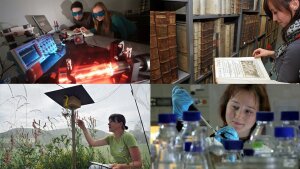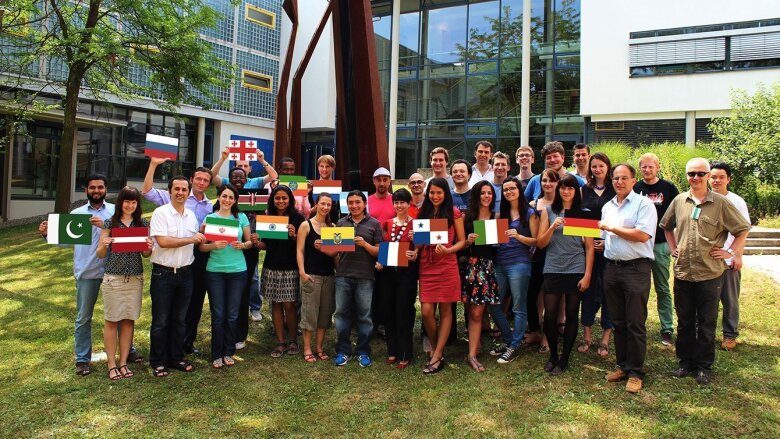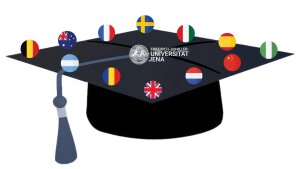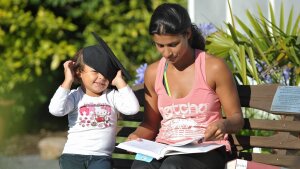
‘The Friedrich Schiller University Jena is part of society. It is committed to the freedom of research and teaching and contributes to shaping the future by providing solutions for society’s grand challenges through science and education.’
Mission statement of Friedrich Schiller University Jena
This commitment and the values derived from it – gathering and spreading light (Light), preserving and nurturing life (Life), and protecting and shaping liberty (Liberty) – apply to all areas of the university's activities, including the advancement of young researchers.
The doctorate is a central task of the university. With these guidelines, the Friedrich Schiller University of Jena (FSU) provides orientation for the doctoral phase. The guidelines are intended to promote a successful doctorate. Guidelines are recommendatory in character. They
- call to mind how doctoral relationships are successfully designed, and provide university-wide orientation points for all those involved in the doctoral process,
- identify success factors and optimal conditions for the doctorate across all disciplines and
- present the core of the successful practice of the doctoral culture at FSU Jena across all disciplines
-
1. Research Setting
"The core task of young researchers is their own distinct and genuine research" (translated from UniWiNDpdf, 484 kb · de, 2011).
To do this, doctoral researchers need autonomy and flexibility, as well as structure and reliability. The supervision during the doctoral phase should support the independent achievements of the doctoral candidates in the best possible way.
The university is responsible for an optimal research setting, and especially for fostering and maintaining a research culture that provides freedom as well as integration and constructive feedback. Therefore the university is active in and responsible for supporting young researchers with structural and organisational measures, like issuing principles to structure fixed term employment, which allow doctoral researchers to focus on their research, or to adequately provide resources that are needed for research.
The integration into a work group, a graduate programme and other scientific networks gives doctoral researchers inspiration and fosters the continuous communication and exchange with supervisors, doctoral researchers and other scientists or scholars who are working on similar research topics on a local level and beyond. In case extraordinary events occur that affect the conditions of doctorates, the university has an institutional responsibility to make special arrangements.
Group image of an international Research Training Group
Image: Graduierten-Kolleg -
2. Admission and selection procedures
Recruitment in a structured programme
Image: istockphoto.comThe doctoral regulations ensure transparent procedures for the admission of doctoral candidates by the faculties. They ensure both the application of high quality standards and the non-discriminatory admission of graduates who fulfil the minimum requirements for admission in accordance with the Thuringian Higher Education Act. In order to provide security regarding the individual admission requirements, admission should take place right at the beginning of the work on the doctoral project.
The requirements and procedures for the awarding of doctoral positions and doctoral scholarships should also be transparent. Usually these positions and scholarships are offered by announcement, and awarded according to the principles of best selection. For the admission of doctoral candidates to structured programmes, decisions made by selection committees made up of several university professors have proven to be effective.
-
3. Supervision
Doctoral candidate talking with her supervisor
Image: istockphoto.comSupervisors accompany doctoral researchers on their way through their doctorate. Both parties are responsible for creating a successful supervision situation.
The responsibility for supervising a doctorate lies primarily with one person (first supervisor). This should be supplemented by a co-supervisor or a supervisory team (‘thesis committee’), as it is already practised frequently within the framework of structured doctoral programmes.
The doctoral regulations of the faculties determine who is entitled to supervise. Traditionally, the supervision of doctoral candidates is one of the basic tasks of university professors. Increasingly, the independent leaders of junior research groups are also entitled to take on the role of first or second supervisorpdf, 235 kb.
Other persons, for example postdocs or external mentors, can be involved in the supervision with reduced responsibility. This opens up the possibility of broader subject-specific and interdisciplinary support, offers doctoral researchers additional contact persons and allows postdocs to gain experience with the supervision of doctoral researchers. In all models of multiple supervision and the involvement of additional persons, a clear distribution of roles is necessary in order to prevent a diffusion of responsibility.
Good supervision must find the appropriate individual balance between granting freedom for independent research and providing professional and social support. It focuses above all on supporting the independent research activity of doctoral researchers, on high quality and scientific relevance of the research, including the communication of the rules of good scientific practise and the monitoring of compliance with them, as well as the completion and submission of the dissertation in an appropriate time frame. In addition, good supervision supports the introduction to the national and international scientific community, gives advice on meaningful qualification content and suitable professional career steps, and motivates and supports doctoral researchers in challenging phases (see herepdf, 662 kb).
Continuous and reliable supervision is a crucial contribution to a successful doctorate. The frequency of supervision can vary according to individual and subject-cultural requirements as well as the respective phase in the doctoral process.
At the beginning of the doctorate, a supervision agreement is concluded between the doctoral candidate and the supervisors. A supervision agreement is intended to make the relationship between the doctoral candidate and the supervisors transparent for both sides in terms of content and time.
Supervision agreements also help to align mutual expectations. They can be used as a tool that supports open and objective communication in the supervision relationship. At Jena University, the supervision agreement is a prerequisite for admission as a doctoral candidate at a faculty. The doctoral regulations specify the form and content. At a minimum, a supervision agreement must contain the names of the doctoral candidate and supervisor(s), the doctoral topic, the intended type of dissertation (publication-based or monograph) and the respective responsibilities of the doctoral candidate and supervisor(s). Among other things, doctoral candidates and supervisors undertake to comply with the rules of good scientific practice. The University of Jena provides sample agreements based on the recommendations of the German Research Foundation (DFG).
Good supervision includes regular supervision meetings. The doctoral candidate and the first supervisor should have at least one detailed conversation about the status of the doctorate per year. The discussions can be initiated by both supervisors and doctoral candidates and should take place in a timely manner. It is helpful to have open communication on an equal footing regarding scientific questions, as well as clear statements by the supervisor regarding the orientation for the time after the doctorate. The meetings can be held on the basis of the doctoral candidate's progress reports. The conversations should not only be about the progress of the doctorate, but also about perspectives for the further career. Jena University provides a guideline for conducting conversations about the status of a doctoratepdf, 521 kb · de, which gives an overview of the usual topics and can be used to protocol outcomes of the conversation.
-
4. Integration into the scientific community
Mikrofon vor Menschen
Image: istockphotoGood supervision includes that doctoral researchers are supported in their introduction to the national and international community of researchers. Doctoral researchers need regular opportunities to present their doctoral project and discuss it with professional colleagues locally, and also nationally and internationally. This includes the development of an own academic network, the participation in conferences and the publication of research outcomes.
-
5. Qualification
Learn moreWorkshop
Image: Jan-Peter Kasper (University of Jena)Doctoral candidates should be supported in their further qualification. They should be given the opportunity to attend qualification events with subject-related, methodological and interdisciplinary content, supplemented by workshops for the acquisition of teaching and supervision skills as well as workshops on career orientation. Of particular importance is the further qualification for ‘good scientific practice’. With regard to the extent of qualification events, a balance must be achieved between substantial and helpful further qualification and an unnecessary prolongation of the doctorate. It has proven successful that the qualification plan is developed jointly by the doctoral candidate and the supervisor, and consented by both.
-
6. Topic and duration of the doctorate
The doctorate is a temporary phase in the qualification of scientists or scholars. How much time is needed for the doctorate in each individual case depends not only on the discipline, but also on the scope and quality of the supervision and on the individual conditions of the doctorate (e.g. occupational, family and financial situation). The duration of the doctorate should usually not exceed four years. The choice of the research topic for the doctorate, its sufficient limitation and a critical risk assessment, have a strong influence on the time that is needed for the doctorate.
Here the supervisors have a special responsibility – of course taking into account the scientific autonomy and independence of the doctoral candidates as well. Regular discussions with supervisors, which are explicitly dedicated to the time structure, the scope and the content of the doctorate, help to support the appropriate limitation of the duration of the doctorate. Last but not least, the faculties also bear responsibility in that they carry out the doctoral examination process without unnecessary delay.
-
7. Doctoral Examination Procedure
The doctoral regulations define how the doctoral examination procedures are conducted. An important element of every doctoral examination procedure is the appointment of the doctoral examination committee and the reviewers by the Faculty Council. In the case of inter-faculty topics, it is good practice to involve researchers from other faculties and, in the case of cooperation with other universities and non-university research institutions, also researchers from these institutions in the procedures.
Publication-based dissertations place special demands on the selection of reviewers. On the one hand, potential bias due to the co-authorship of supervisors or reviewers must be taken into account; on the other hand, the direct supervisors have the best insight into the development process of the dissertation and thus contribute in a special way to quality assurance. One option for quality assurance is to call in additional and, if necessary, external reviewers.
It is also of fundamental importance to ensure good scientific practice with regard to the dissertation, including the check for plagiarism. The supervisors bear the main responsibility here. In addition to the display of the dissertation in the dean's office, an electronic display has proven to be of advantage.
Oral examinations open to the public (disputations, colloquia) offer an excellent opportunity to evaluate the achievements of doctoral candidates and at the same time to help them gain greater visibility.
-
8. Doctorates in Cooperation
Learn moreJoint doctoral degree between universities of different countries and the Friedrich Schiller University Jena
Image: Istockphoto.com / Flaticon.com (@roundicon)Scientific achievements are often made in cooperation between several people, working groups and scientific institutions. For doctorates, the participation of researchers from other national and international universities and non-university research institutions, or the conduct of the doctoral project within a joint graduate programme, is also common practice. The regulations for binational joint doctorates (Cotutelle de Thèse) and for doctorates in cooperation are a guidance for these doctorates. The cooperating scientists or scholars as well as the cooperating research institutions are equally involved in the supervision of doctoral candidates and in the doctoral examination procedure.
-
9. Equality, family and doctorate, non-discriminatory environment
Learn moreMother with child who wears a doctoral hat
Image: Jan-Peter Kasper (University of Jena)In the selection and admission of doctoral candidates, in the supervision and in the assessment of the dissertation, as well as in the oral examination, no one may be discriminated against on the basis of sex or gender, of cultural, ethnic or social origin, of religion and world view, of sexual identity or of disability. In particular, there should be awareness of the observed effect of an ‘unconscious bias’ according to which in some subjects there is a gender bias in the evaluation of doctoral performance in the form that the dissertations of female doctoral candidates are evaluated less frequently with ‘summa cum laude’ than the dissertations of male doctoral candidates.
The doctoral phase often coincides with the period of starting a family. It is highly commendable to balance work on the doctorate with family-related commitments. This applies equally to women and men. Essential for a successful work-life balance are financial security for the entire doctoral phase, a flexible and predictable handling of working hours and locations, as well as specific support for research activities if these cannot be carried out due to pregnancy, for example.
The proportion of women among doctoral and post-doctoral researchers is significantly lower than among Bachelor's and Master's students. Therefore the university stresses that women must be able to pursue doctoral degrees without structural and procedural obstacles. In the same way as men, women should be encouraged and actively supported to start and continue an academic career. A working climate characterised by equal appreciation for women and men should be a matter of course for all members of the university.
As the international diversity increases, the university and all of its members should take into account the specific concerns of international doctoral candidates on both an institutional and individual level, and allow them to fully participate in the university’s research and research contexts.
-
10. Ombudsman procedure
Learn moreTwo conflict parties and a mediator
Image: istockphoto.com/Andrii_YalanskyiThe relationship between doctoral researchers and supervisors in Germany is particularly complex due to the frequent coincidence of different roles (supervisor, reviewer, boss, co-author). It requires a sensitive and reflective approach to the resulting dependence of doctoral researchers on their supervisors. Power abuse and the exploitation of dependencies must be prevented and obstructed on all levels.
In cases of conflict between doctoral researchers and supervisors that can’t be solved among both parties, there are ombudsmen that can be contacted. For such cases, the doctoral regulations provide for ombudsman procedures at faculty or university level. At university level, the persons who participate in these procedures are particularly experienced in doctoral supervision and are elected by the Senate.
-
11. Alumni
Graduierte werfen Hüte hoch
Image: Arlene KnipperThe success of a doctorate becomes apparent, in the narrower sense, immediately after completing the examination procedure through the evaluation of the reviewers and the doctoral examination committee.
The success of the qualification phase ‘doctorate’ in the broader sense shows itself in the further professional career. By tracking and documenting the professional careers of their graduates, supervisors and faculties can use the expertise of the alumni for the qualification of doctoral candidates and their professional orientation.
Johannisstraße 13
07743 Jena










